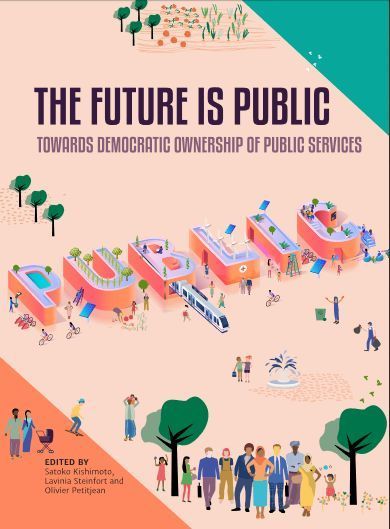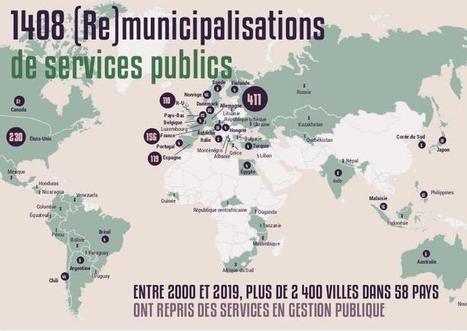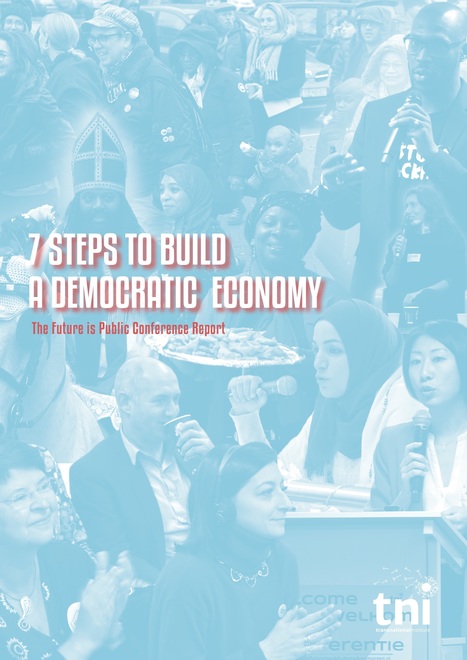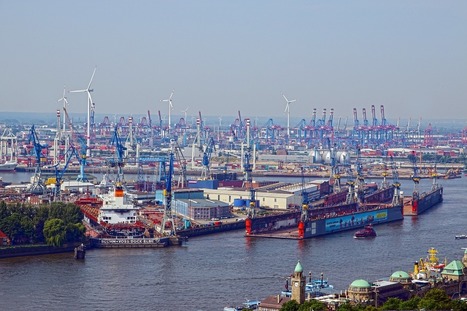 Your new post is loading...

|
Scooped by
Energy Cities
March 21, 4:19 AM
|
Amid an ever shifting political landscape, Polish municipalities offer unique insights into how democratic self-governance structures can ensure quality local public service provision. Following the end of communism, communities fought for transitioning from a highly centralised system to robust local ownership, withstanding the privatisation wave that swept the globe in the 1990s.Complementary to remunicipalisation debates, this article pulls out multiple creative ways in which Poland’s local authorities secure municipal service delivery, including intermunicipal collaboration (public-public partnerships), tendering in alliances to overcome private finance and autonomous local policy making to ensure services are in line with local needs.However, it remains an ongoing struggle to defend democratic municipal services against the threat of privatisation and authoritarianism.

|
Scooped by
Energy Cities
January 7, 11:19 AM
|
Fin mai, Saint-Etienne Métropole créait une Société d’économie mixte baptisée « Energies vertes et métropole ». Début décembre, lors du Forum de la transition écologique et énergétique 2024, organisé par SEM au théâtre du parc à Andrézieux-Bouthéon, sa signature était officialisée.

|
Scooped by
Energy Cities
June 4, 2021 2:41 AM
|
Au premier rang de ces ressources essentielles figure l’eau, dont la bonne gestion et la gouvernance (sa préservation, son mode de gestion mais aussi la pérennisation de ce dernier… ) sont un des enjeux majeurs des décennies à venir, à l’échelle planétaire comme à l’échelle locale, y compris dans des territoires qui semblaient jusqu’à présent préservés de tensions sur cette ressource. Quels rôles pour l’acteur public dans la gestion de cette ressource, entre meilleure implication des habitant.es, égalité d’accès et auto-gestion citoyenne ? Comment repolitiser le rapport à cette ressource essentielle voire, dans un contexte d’urgence climatique et environnementale, dessiner de véritables métamorphoses institutionnelles et juridiques ?

|
Scooped by
Energy Cities
January 5, 2021 2:08 AM
|
Covid-19 has once again demonstrated the significance of safe, accessible and affordable water for all. It has also highlighted enormous disparities in service provision while at the same time dealing a blow to public water and sanitation operators around the world due to massive drops in revenues, rapidly rising costs and concerns about health and safety in the workplace. This book provides the first global overview of the response of public water operators to this crisis, shining a light on the complex challenges they face and how they have responded in different contexts.

|
Scooped by
Energy Cities
October 19, 2020 10:33 AM
|
In 2017, Pueblo became one of the first cities in Colorado to commit to powering itself entirely with renewable energy. The decision was driven in part by frustrations with sky-high energy costs: Almost one quarter of Pueblo’s population lives under the poverty line, but residents of the Front Range city still pay some of the highest electric rates in the region. Energy costs rose dramatically after the city’s electric utility, South Dakota-based Black Hills Energy, invested in a new fossil gas plant, passing the costs on to already cash-strapped Pueblo families.

|
Scooped by
Energy Cities
July 27, 2020 9:36 AM
|
Across the country, local and state officials and citizens are struggling to overcome a set of deep and challenging problems, which have been further revealed, and exacerbated, by Covid. These include stark inequality, persistent poverty, disappearing small businesses, racial oppression, … Read More

|
Scooped by
Energy Cities
May 28, 2020 7:54 AM
|
The Future is Public: Towards Democratic Ownership of Public Services
Noting the inadequacy of national and multilateral policies to tackle the climate crisis and widening inequality, a growing network of progressive municipalities has developed its own policies and measures to do so. (Re)municipalisation is one of the key strategies to address the challenges of our time, including pandemics such as Covid-19 which has made people realise that medical staff, caregivers, cleaners, waste collectors, water and energy workers keep our societies alive. Privatisation is such an ill-advised policy because these are the very services that tend to be outsourced first. Cities are well-positioned to reverse the tide and prioritise public health and well-being, to explore democratic models for public services and their management, and to advance innovative economic models that build community wealth and create decent jobs. Download

|
Scooped by
Energy Cities
January 29, 2020 10:45 AM
|
From sparkling water fountains to better waste services and lower drug prices, cities are showing the benefits of remunicipalisation

|
Scooped by
Energy Cities
April 10, 2019 5:00 AM
|
Fife Council wanted to understand how a community in Fife could reduce its carbon footprint by 80%. Through joint decision making with the local community we found out which low carbon heat and electricity solutions would be most suitable, and how much it would cost. The purpose of this project was to help the local community understand their energy needs, and how it could be supplied locally in a low carbon manner.

|
Scooped by
Energy Cities
April 5, 2019 5:33 AM
|
In a world in which fear and insecurity are being twisted into hate, and inequalities, xenophobia and authoritarianism are on the rise, a renewed municipalist movement is emerging to defend human rights, democracy and the common good.
Fearless Cities is the first book written by and for the global municipalist movement. Written collaboratively by more than 140 people from 19 countries, the Fearless Cities guide is made up of four parts:
- Essays explaining municipalism and its role in tackling the challenges of our time.
- Organizing toolkits about how to set up a municipalist platform, draw up a participatory manifesto to how to crowdsource funding and win elections.
- Policy toolkits with examples of transformative policies being implemented in towns and cities across the world.
- Profiles of 50 pioneering municipalist platforms from every continent.
|

|
Scooped by
Energy Cities
March 21, 4:14 AM
|
What if energy could be reclaimed as a global public good, free from profit-driven systems and rooted in justice? The Reclaiming Energy report offers systemic solutions to the climate crisis, advocating decolonial, democratic governance and transformative public–community partnerships. By redefining energy and resource justice, it charts a clear path toward a just, sustainable, and democratic future.

|
Scooped by
Energy Cities
November 29, 2022 9:07 AM
|
Faced with the convergence of economic, social, political and environmental crises, the importance of the public sector has been rediscovered on a global scale. The article offers a review of the evolution of political and academic debates on public ownership in general and public services provision in particular over the last decades, with emphasis on the energy sector.

|
Scooped by
Energy Cities
January 13, 2021 6:27 AM
|
Remunicipalisation could help communities take back control in a way that transcends the 2016 Brexit referendum.
From sparkling water fountains to better waste services and lower drug prices, cities are showing the benefits of remunicipalisation

|
Scooped by
Energy Cities
October 29, 2020 9:48 AM
|
Promesse de campagne, la création d’une régie publique de l’eau constitue le premier dossier d’envergure de la majorité écologiste. L’objectif de la métropole : préserver les ressources tout en mettant en place « une tarification sociale et progressive ».

|
Scooped by
Energy Cities
October 1, 2020 8:37 AM
|
From Barcelona to Grenoble, towns, cities and regions are reclaiming democratic control over vital services like water and healthcare. We spoke to Transnational Institute researcher Lavinia Steinfort about how, contrary to decades of received wisdom, reversing privatisation results in more accessible, accountable and cost-effective public services. Seen from the midst of a pandemic, municipalisation offers a route through the crisis towards more environmentally and socially just societies.

|
Scooped by
Energy Cities
June 22, 2020 9:51 AM
|

|
Scooped by
Energy Cities
March 3, 2020 10:53 AM
|
This report is based on the panels, workshops and discussions of the international "Future is Public: Democratic Ownership of the Economy" conference that took place on 4-5 December, 2019 in Amsterdam

|
Scooped by
Energy Cities
September 18, 2019 5:51 AM
|
Nationalising the retail arms of the big six energy firms would significantly boost the UK's bid to become carbon neutral by 2050, says UNISON in a report published today (Monday). Power to the People calls on a future government to bring into public ownership the parts of British Gas (Centrica), SSE, E.ON, EDF

|
Scooped by
Energy Cities
April 5, 2019 10:57 AM
|
10 ans après la création d’Eau de Paris, quel bilan dressez-vous?
Nous avons réussi à démontrer que le modèle d’entreprise publiqu

|
Scooped by
Energy Cities
October 15, 2018 4:20 AM
|
On September 22 2013, 50.9% of the Hamburg citizens voted in a referendum for the full remunicipalisation of the energy distribution grids in the city. The referendum was initiated by the citizen’s initiative ‘Our Hamburg – Our Grid’ (OHOG) and constituted the climax of an intense political controversy that lasted for more than three years. Through this vote Hamburg has received international attention and became a flagship example for remarkable civil engagement. In the international best-seller “This Changes Everything” (2014), Naomi Klein sees the driving motive in the people’s ‘desire for local power’. Indeed it is true that under the constitution of the City of Hamburg, a successful referendum has a binding effect, which left the City government no other option than to announce the implementation of the referendum decision and to start the remunicipalisation process immediately after the vote
|
 Your new post is loading...
Your new post is loading...



























